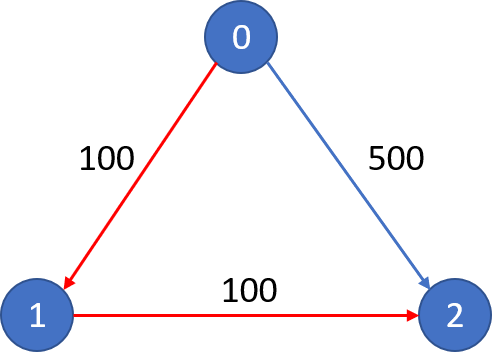[LeetCode] 787. Cheapest Flights Within K Stops_Medium tag: Dynamic Programming, BFS, Heap
2018-08-09 00:00 Johnson_强生仔仔 阅读(278) 评论(0) 收藏 举报There are n cities connected by m flights. Each fight starts from city u and arrives at v with a price w.
Now given all the cities and fights, together with starting city src and the destination dst, your task is to find the cheapest price from src to dst with up to k stops. If there is no such route, output -1.
Example 1: Input: n = 3, edges = [[0,1,100],[1,2,100],[0,2,500]] src = 0, dst = 2, k = 1 Output: 200 Explanation: The graph looks like this:

The cheapest price from city0to city2with at most 1 stop costs 200, as marked red in the picture.
Example 2: Input: n = 3, edges = [[0,1,100],[1,2,100],[0,2,500]] src = 0, dst = 2, k = 0 Output: 500 Explanation: The graph looks like this:

The cheapest price from city0to city2with at most 0 stop costs 500, as marked blue in the picture.
Note:
- The number of nodes
nwill be in range[1, 100], with nodes labeled from0ton- 1. - The size of
flightswill be in range[0, n * (n - 1) / 2]. - The format of each flight will be
(src,dst, price). - The price of each flight will be in the range
[1, 10000]. kis in the range of[0, n - 1].- There will not be any duplicated flights or self cycles.
这个题目有点类似于[Leetcode] 863. All Nodes Distance K in Binary Tree_ Medium tag: BFS, Amazon, 所以我用BFS, 只是不将dst add进入visited里面, 然后利用 stops <K来做一个
避免太多判断, 但是并不能pass所有的test cases, 我想可能是因为有些node需要重复利用, 因此就将visited去掉, 但是利用stops <K 和 psum <= ans 来避免过多的重复遍历某些不需要的值.
1. Constraints
1) 题目的Note解释很清楚, 基本没有特殊的test case, 但是没提到src == dst, 所以加上这个edge case
2. Ideas
BFS 时间复杂度还真的不好说...
3. Code
class Solution: def cheapestFlight(self, n, flights, src, dst, K): if src == dst: return 0 queue, graph, prices, ans = collections.deque([(src, -1, 0)]), collections.defaultdict(set), collections.Counter(), None for s, e, p in flights: graph[s].add(e) prices[(s,e)] = p while queue: node, stops, psum = queue.popleft() if stops <= K and (not ans or psum < ans): if node == dst: ans = psum for each in graph[node]: queue.append((each, stops + 1, psum + prices[(node, each)])) return ans if ans else -1


 浙公网安备 33010602011771号
浙公网安备 33010602011771号